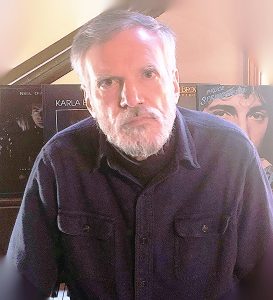 Tell us about yourself.:
Tell us about yourself.:
I grew up in Revere, Massachusetts—a working class city just north of Boston. I live in Georgetown, MA now—a much more rural area. Well it was much more so when we moved here 30 years ago (smile). I dropped out of Salem State University and finished my undergraduate studies at Harvard University Extension. Later I enrolled in graduate courses at Boston University before earning my Master's Degree at the University of Massachusetts, Boston. I taught literature and memoir courses at UMass.
Where did you grow up, and how did this influence your writing?:
The fact that I grew up in a lower working class city just outside of Boston has influenced my writing both generally and specifically. In the case of my most recent work, the novel "Visions of Johanna", the chip on Matt's shoulder (one of the main characters) as well as the themes of denial and masculinity—as well as the concept of faith—have all been mined from this background.
What authors have influenced you?
The fact that I grew up in a lower working class city just outside of Boston has influenced my writing both generally and specifically. In the case of my most recent work, the novel "Visions of Johanna", the chip on Matt's shoulder (one of the main characters) as well as the themes of denial and masculinity—as well as the concept of faith—have all been mined from this background.
Do you have any advice for new authors?
Find and hire a good and trustworthy editor. Ask for references, a sample of his or her editing process, and a free consultation. This is probably one of the most important decisions you can make as a new author. I think the "writing every day" advice that you hear very often is not practical for most of us who work or have child care responsibilities etc. And, that type of counsel can really set up an aspiring writer for failure, because he or she ends up feeling guilty if not at the writing desk every day and this leads to discouragement and lack of confidence. I'm not sure how successful an author can be without participating in a decent amount of reading in their chosen genre. (My definition of "success" is finding and being able to entertain readers—not necessarily garnering large sales numbers.)
What is the best advice you have ever been given?
In regards to writing (or the artistic life), when I was a graduate student at Boston University, the late short story writer and novelist Ivan Gold urged us to "stay away from negative people"—the ones who tell you, for whatever reason, you can't do this. I've read (and assigned my students) dozens of books on craft and although I'm sure those have been more than helpful, Professor Gold's advice was probably the best.
If we're talking about life, following the Golden Rule is probably the most sound piece of advice I've heard.
What are you reading now?
"Father of Rain" by Lily King
What’s your biggest weakness?
I think being afraid of being vulnerable, of exposing myself to others—in life as well as on the page.
What is your favorite book of all time?
I don't have one book. And, many of my author friends and others now have come to think of it as an overrated novel, but "The Great Gatsby" is still right up there on my list. Fitzgerald managed to expose the human condition in very few pages with a level or prose that, at first, was mistakenly considered simplistic. It is a shame that he was never able to witness that book's eventual praise.
Do you remember the first story you ever read, and the impact it had on you?
I remember at a very young age—preschool—reading a book from the Little Golden Book series about a king who never smiled. Around that time also, there was a story of a lost dog told in first person from the perspective of the dog—I wish I remembered the title. Both of them reflected a type of poignancy I must have related to—for whatever reason. But as I got older, early in high school, I think "The Grapes of Wrath" was the first book that really knocked my socks off.
What has inspired you and your writing style?
Slice of life tales of working class people who sometimes act heroically, mostly accept each other's frailties, and usually try to face each new day with courage, resolve, and humor.
What are you working on now?
I have a rough draft of a novel and am revising a linked collection of short stories.
If you could share one thing with your fans, what would that be?
That no matter what their lot in life, they unknowingly practice and are capable of performing heroic acts every day of their lives. And, these actions don't have to be profound. They can be as simple as letting the car drive out before you at a 4-way stop sign, smiling and saying hello to an elderly person in the post office, tipping a waitress slightly more than the standard 15 or 20 per cent, pushing someone's shopping carriage back to the grocery store's parking lot corral after they've loaded their car.
Peter Sarno’s Author Websites and Profiles
Website
Amazon Profile
Goodreads Profile

0 Comments